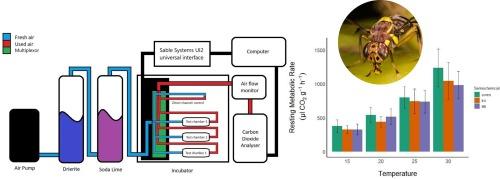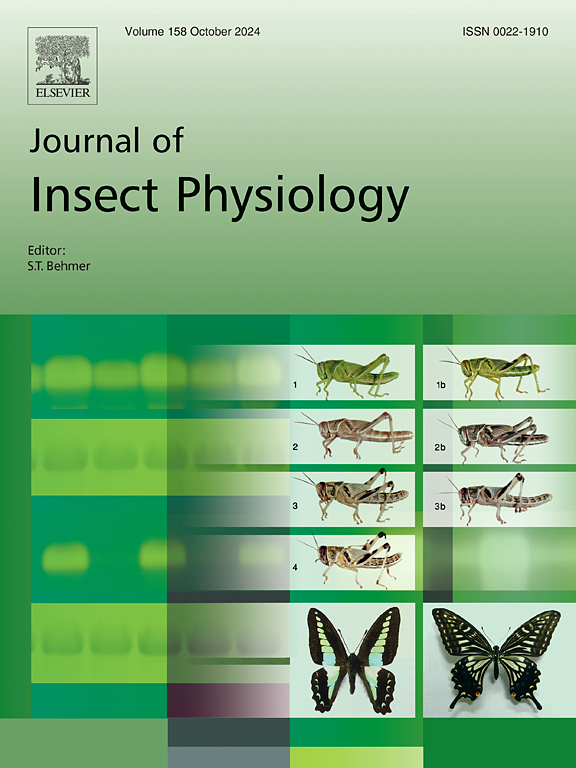The effects of diet and semiochemical exposure on male Bactrocera dorsalis (Hendel) (Diptera: Tephritidae) metabolic rate at a range of temperatures
IF 2.3
2区 农林科学
Q1 ENTOMOLOGY
引用次数: 0
Abstract
The oriental fruit fly, Bactrocera dorsalis (Hendel) (Diptera: Tephritidae), is an invasive species that has rapidly spread across the African continent, endangering the security of agricultural industries. The sterile insect technique (SIT) is being investigated as a viable additional pest management tool to suppress B. dorsalis populations after its successful implementation in other parts of the world. There is evidence to suggest that pre-release nutritional and semiochemical treatments for sterilised males can enhance their competitive performance against wild type males in SIT programs. This study examined how sterilisation, a diet rich in protein (addition of yeast hydrolysate) or containing semiochemicals (methyl eugenol or eugenol) affected the resting metabolic (RMR) of male B. dorsalis at different temperatures (15 – 30 °C), measured using flow-through respirometry. Our results indicated that the negative effect of sterilisation on RMR decreased as temperature increased and that duration of exposure to semiochemicals for 1 to 4 days was not a significant influencing factor on male B. dorsalis RMR. Protein-rich diet increased average RMR, but the difference in RMR between dietary groups decreased as temperature increased. Semiochemical feeding reduced the average RMR in male B. dorsalis. The difference in RMR between males that consumed semiochemical and those that did not increased with as temperature increased.

在一定温度范围内,饮食和半化学暴露对雄性 Bactrocera dorsalis (Hendel) (双翅目:Tephritidae)新陈代谢率的影响。
东方果蝇 Bactrocera dorsalis (Hendel)(双翅目:Tephritidae)是一种入侵物种,已在非洲大陆迅速蔓延,危及农业产业的安全。昆虫不育技术(SIT)在世界其他地区成功实施后,目前正在作为一种可行的额外害虫管理工具进行研究,以抑制背甲线虫的数量。有证据表明,在 SIT 项目中,对绝育雄虫进行释放前营养和半化学处理可提高其与野生型雄虫的竞争能力。本研究考察了绝育、富含蛋白质的食物(添加酵母水解物)或含有半化学物质(甲基丁香酚或丁香酚)如何影响雄性背甲蛙在不同温度(15 - 30 °C)下的静息代谢(RMR)。我们的研究结果表明,随着温度的升高,绝育对RMR的负面影响减小,而暴露于半化学物质1-4天的时间长短对雄性背甲蛙RMR的影响不大。富含蛋白质的日粮提高了平均 RMR,但日粮组之间 RMR 的差异随温度升高而减小。半化学饲粮降低了雄性背甲鱼的平均RMR。随着温度的升高,摄入半化学物质和未摄入半化学物质的雄性之间的RMR差异增大。
本文章由计算机程序翻译,如有差异,请以英文原文为准。
求助全文
约1分钟内获得全文
求助全文
来源期刊

Journal of insect physiology
生物-昆虫学
CiteScore
4.50
自引率
4.50%
发文量
77
审稿时长
57 days
期刊介绍:
All aspects of insect physiology are published in this journal which will also accept papers on the physiology of other arthropods, if the referees consider the work to be of general interest. The coverage includes endocrinology (in relation to moulting, reproduction and metabolism), pheromones, neurobiology (cellular, integrative and developmental), physiological pharmacology, nutrition (food selection, digestion and absorption), homeostasis, excretion, reproduction and behaviour. Papers covering functional genomics and molecular approaches to physiological problems will also be included. Communications on structure and applied entomology can be published if the subject matter has an explicit bearing on the physiology of arthropods. Review articles and novel method papers are also welcomed.
 求助内容:
求助内容: 应助结果提醒方式:
应助结果提醒方式:


